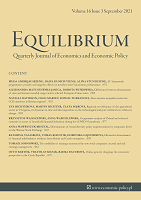Regional smart specialisations in the light of dynamic changes in the employment structure: the case of a region in Poland
Regional smart specialisations in the light of dynamic changes in the employment structure: the case of a region in Poland
Author(s): Joanna Kudełko, Katarzyna Żmija, Dariusz ŻmijaSubject(s): Regional Geography, Economic development, Socio-Economic Research
Published by: Instytut Badań Gospodarczych
Keywords: employment structure; employment dynamics; regional specialisations; smart specialisations;
Summary/Abstract: Research background: Among the determinants of the socio-economic development of the region, an important role is played by its endogenous potential. It is reflected in the industry structure of the region, formed in the process of its historical development. The industry structure is the basis for the development of regional specialisations. One of the criteria for defining specialisations is the employment structure by sections and divisions of the national economy. The definition of regional specialisations is indispensable for planning the development policy and for formulating regional strategies. Purpose of the article: The main objective of the paper is the analysis and evaluation of employment structure as a criterion for the delimitation of industries identified as smart specialisations in the region. The study covers the case of selected region in Poland at NUTS-2 level - the voivodeship of Małopolska. Methods: The study is based on GUS unpublished data (Statistics Poland) for 2009 and 2018. It makes use of descriptive statistical analysis methods and structure and dynamics ratios, as well as Florence's specialisation coefficient. Findings & value added: The research has shown that the employment structure indicating the presence of the region's specialisation in given industries is an important, but not sufficient criterion for the evaluation, whether the delimitation of industries recognized as smart specialisations was appropriate. In the light of the conducted research, it seems fully justified to grant the status of smart specialisation in Małopolska to Information and Communication Technologies as well as to Creative and Leisure Industries. In the context of changes to employment dynamics and structures, the possible development-oriented smart specialisations are as follows: Manufacture of metals and metal products, Electronics and machine industry, and Chemistry. On the other hand, the identified specialisations: Life science and Sustainable energy are not in line with changes in the region's employment structure. The paper proposes one of the possible ways of precise identification of distinctive regional industries with high development potential. The structure of employment and changes occurring in this area make it possible to determine the main forces of the region's endogenous potential, and thus may form the basis for the determination, and in the longer term, assessment of the relevance of identified regional smart specialisations. The added value of the study is, therefore, an attempt to assess, on the example of a selected region, to what extent changes in regional specialisations reflected in the existing employment structure confirm the accuracy of the selection of industries identified as regional smart specialisations. The presented case is an exemplification of the proposed method, which can also be successfully applied to other European regions.
Journal: Equilibrium. Quarterly Journal of Economics and Economic Policy
- Issue Year: 17/2022
- Issue No: 1
- Page Range: 133-171
- Page Count: 39
- Language: English

